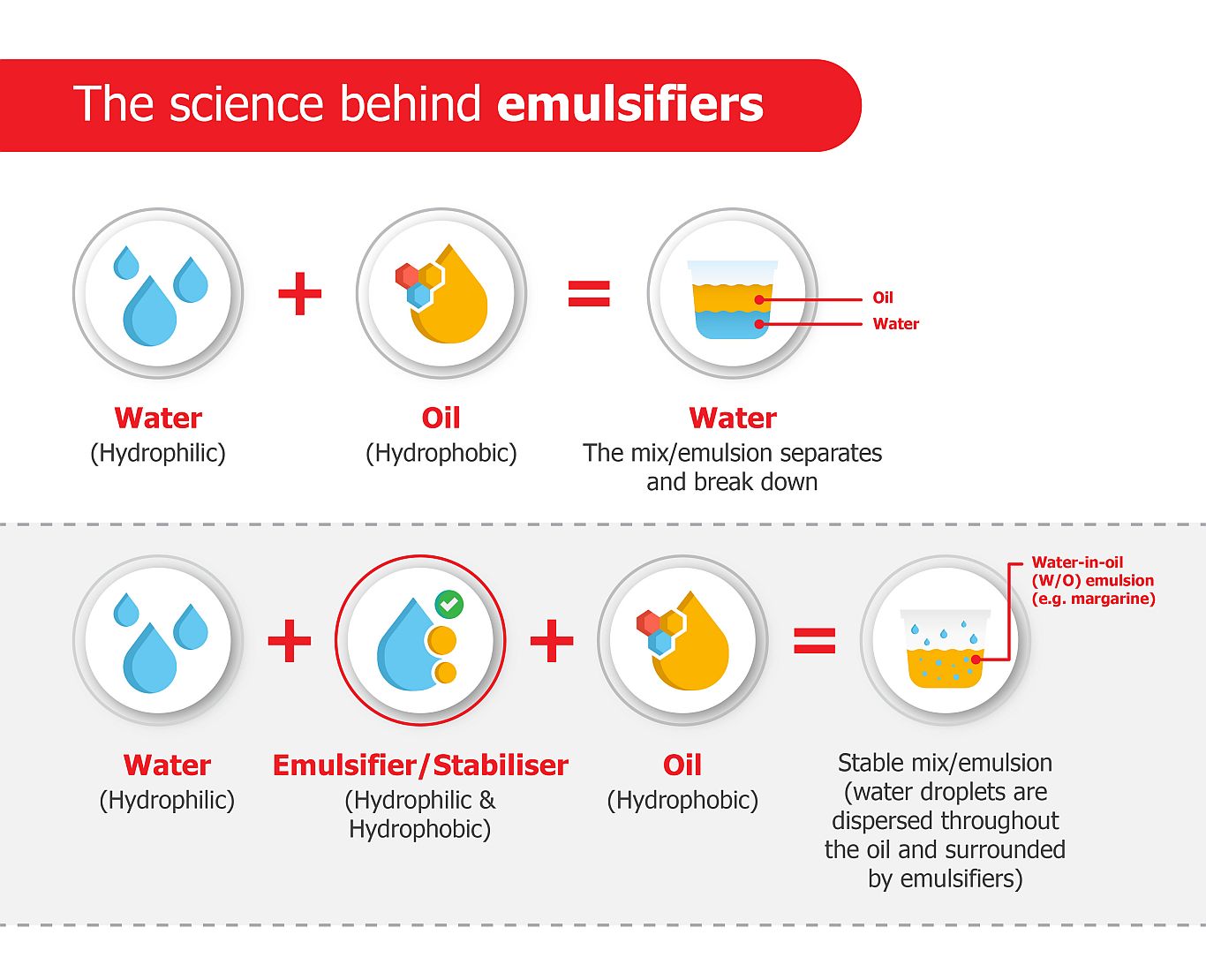Emulsifiers Explained: What They Are and Why They Matter
Emulsifiers Explained: What They Are and Why They Matter
Blog Article
The Scientific research Behind Emulsifiers and Their Significance in Modern Manufacturing
Emulsifiers play an important role in modern-day manufacturing, acting as the unsung heroes that mix oil and water for a large range of items. As consumer preferences change towards cleaner labels, the need for innovative emulsifiers is expanding.
What Are Emulsifiers?
Emulsifiers are essential representatives in the globe of food and product production, acting as the glue that binds two or else immiscible liquids, like oil and water. Typical instances include lecithin located in egg yolks and soybeans, and mono- and diglycerides used in different refined foods.

When you whip up a salad dressing or enjoy a velvety treat, emulsifiers aid keep that excellent structure. They assure your items have a regular mouthfeel and appearance, boosting your overall experience. Without emulsifiers, lots of foods would certainly divide, resulting in unfavorable appearances and tastes. So, next time you delight in a smooth sauce or spread, keep in mind the unhonored heroes-- emulsifiers-- that make it all feasible.
The Chemistry of Emulsification
When you blend oil and water, you could observe they do not mix quickly; that's where the chemistry of emulsification comes into play. To overcome this challenge, emulsifiers are employed.
These molecules have a hydrophilic (water-attracting) head and a hydrophobic (water-repelling) tail. When you include an emulsifier, its particles place themselves at the oil-water user interface, lowering surface area tension and allowing the droplets to mix. The emulsifier forms a protective layer around each droplet, avoiding them from coalescing back right into different layers. Comprehending this chemistry is important for achieving security in items like dressings, creams, and sauces, making emulsification important in modern production.
Kinds of Emulsifiers
Different sorts of emulsifiers play crucial roles in stabilizing mixes of oil and water. You'll often run into two main categories: all-natural and artificial emulsifiers. All-natural emulsifiers, like lecithin from egg yolks or soy, are obtained from plants and animals, making them preferred in foodstuff. They're usually taken into consideration much safer and much healthier choices.
On the various other hand, synthetic emulsifiers, such as mono- and diglycerides, are chemically engineered to boost stability and life span. They're commonly utilized in refined foods and cosmetic items.
In addition, you might encounter non-ionic, anionic, and cationic emulsifiers, each with distinct homes that influence their performance. Non-ionic emulsifiers, as an example, job well in a vast array of pH degrees, while anionic emulsifiers often tend to perform much better in alkaline problems. Recognizing these types can help you select the appropriate emulsifier for your specific application.
Mechanisms of Emulsion Formation
Understanding how emulsions form is important for producing steady mixes of oil and water. When you introduce an emulsifier, it decreases the surface tension in between the 2 fluids, allowing them to mix more conveniently.
The emulsifier particles have a hydrophilic (water-attracting) head and a hydrophobic (oil-attracting) tail. When you include an emulsifier, these molecules arrange themselves at the oil-water user interface. The hydrophilic heads engage with water, while the hydrophobic tails anchor into the oil. This develops a barrier that stabilizes the beads, avoiding them from coalescing.
Applications of Emulsifiers in Numerous Industries
Emulsifiers play a crucial function across numerous markets, making your favored foods smoother and a lot more pleasurable. In cosmetics, they enhance item texture and security, making sure an enjoyable application experience. And also, in pharmaceuticals, they help provide important active ingredients successfully, improving total effectiveness.
Food Industry Makes Use Of
While you might not understand it, emulsifiers play a necessary role in the food sector, improving the texture, security, and life span of many items (Emulsifiers). They're commonly located in salad dressings, sauces, and mayonnaise, aiding to mix oil and water for a smooth, regular product. In baked products, emulsifiers boost dough handling and keep dampness, resulting in a much better appearance and prolonged quality. They're additionally essential in milk products, where they stabilize solutions in lotions and gelato, avoiding separation. Also in treats, emulsifiers help maintain crunchiness and avoid stagnant flavors. By guaranteeing harmony and top quality, emulsifiers are significant to delivering the scrumptious items you delight in on a daily basis, making them a vital active ingredient in modern food manufacturing.
Aesthetic Solutions Advantages
When it comes to aesthetic formulations, emulsifiers are essential for producing items that feel elegant and do properly. You'll see that emulsifiers boost item stability, preventing separation and lengthening shelf life. On the whole, emulsifiers play an essential function in providing top notch cosmetic items that satisfy your elegance needs.
Drug Applications Overview
In the pharmaceutical market, emulsifiers are crucial for formulating effective medications. You'll discover emulsifiers in different dose types, like lotions, lotions, and fluid suspensions, boosting the bioavailability of medicines.
The Influence of Emulsifiers on Item Top Quality

By making certain stable emulsions, you decrease the danger of wasting and expand rack life, ultimately saving you money and time. You'll likewise discover that emulsifiers can enhance the bioavailability of energetic components in your items, making them extra reliable for customers.
Moreover, they enable you to create ingenious formulas that satisfy varied customer needs. Whether you're crafting a velvety clothing or an elegant lotion, emulsifiers are important for accomplishing the preferred results. Basically, by comprehending and leveraging the effect of emulsifiers, you can significantly raise the high quality of your products.
Future Trends in Emulsifier Growth
As the need for cleaner tags and sustainable products rises, the growth of brand-new emulsifiers is readied to develop considerably. You'll notice a change in the direction of plant-based and natural emulsifiers, driven by consumer choices for active ingredients that are eco-friendly and less refined. Advancements in biotechnology will likely improve the functionality and performance of these see emulsifiers, permitting makers to produce stable solutions with less additives.
You could additionally see a boost in multifunctional emulsifiers that not only maintain solutions however also boost flavor, texture, or dietary value. This fad can simplify active ingredient listings while improving item performance.
Moreover, with breakthroughs in nanotechnology, emulsifiers might be engineered at the molecular degree to achieve extraordinary stability and performance. Emulsifiers. As you check out these trends, you'll discover that the future of emulsifier development is not almost capability, however also regarding embracing sustainability and transparency in ingredients
Regularly Asked Questions
Are Emulsifiers Safe for Usage in Food Products?
Yes, emulsifiers are generally risk-free for consumption in food products. They have actually been extensively researched and authorized by food safety and security authorities, so you can enjoy your preferred foods without fretting concerning their influence on your health and wellness.
Can Emulsifiers Be Derived From All-natural Sources?
Yes, you can obtain emulsifiers from all-natural sources. Components like lecithin from egg yolks or soybeans and casein from milk prevail. These natural emulsifiers assist support combinations without synthetic additives, making them preferred in numerous products.

How Do Emulsifiers Influence Rack Life of Products?
Emulsifiers support mixtures, protecting against splitting up and spoilage - Emulsifiers. By keeping uniformity, they expand products' service life, ensuring quality site link and quality. You'll observe that emulsifiers help maintain your favored foods and cosmetics carrying out more than time
What Are Potential Adverse Effects of Emulsifiers?
You might experience digestive system issues when consuming products with emulsifiers, as they can interfere with gut germs. Some researches suggest prospective web links to inflammation or allergies, however extra research is needed to totally understand these effects.

Exist Alternatives to Conventional Emulsifiers?
Yes, there are choices to conventional emulsifiers. You can explore choices like natural periodontals, starches, or lecithin. Each alternative deals unique properties, so experiment to discover what jobs best for your particular application.
Report this page